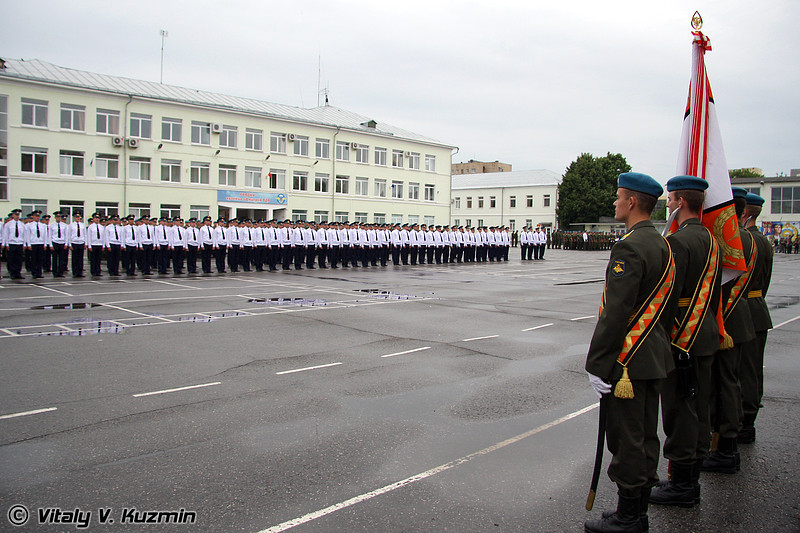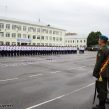
Russian Military Plans New NCO Training Center
Publication: Eurasia Daily Monitor Volume: 6 Issue: 163
By:

In a clear break with its former pattern in producing praporshchiki (sergeants) for the army, the Russian defense ministry has begun forming a professional non-commissioned officer (NCO) corps, which will consist of specialists with almost three years of training at a new facility. Controversially, these NCO’s will be paid on the same level as active generals: 35,000 rubles ($1,100) per month. It not only marks a significant departure from previous efforts to develop an NCO cadre, but reveals new and deeper thinking on such issues within the defense ministry.
On December 1 the new NCO training center will open at the Ryazan higher airborne (VDV) school for preparing junior command personnel, covering 17 military specialist areas in a course lasting 2 years and 10 months. Initially, this will entail 1,700 entrants (2,000 annually thereafter) and they are already earmarked to become commanders and deputy commanders of motor rifle, reconnaissance, airborne, and motor transport platoons, as well as company and battery first sergeants. The defense ministry conducted an intensive publicity campaign to attract sufficient numbers of sergeants for the army and warrant officers for the navy; the response currently appears to be adequate. More than 4,000 current contract and first-term personnel as well as 800 demobilized individuals applied for the elite training program. These applicants are being tested in twelve centers across the country. "We drew applicants based on three persons per slot," explained Colonel Andrei Ivanayev, the Commander of the 5th Motor Rifle Brigade. "My brigade specifically received an allocation from the defense ministry of 100 persons, and I provided that many" (Trud, September 1).
Selection criteria is pitched at a higher standard, conducted in two phases, with the first physical fitness testing ending on September 10, which also includes interviews conducted by military psychologists. The fitness test requires candidates to complete five pull-ups and run 100 meters in full combat kit in less than 15.2 seconds. Successful applicants will then travel to Ryazan, where they will be prepared for taking the YeGE (Unified State Exam), and their combined academic and physical fitness results will be used to enroll the successful candidates; who are scheduled to commence classes on December 1 (Trud, September 1).
In order to maximize the level of interest and secure better quality applicants, financial incentives and free training were offered and according to official sources, which many described these as their main reasons for applying. "NCO graduates will receive at least 35,000 rubles ($1,100) per month, the stipend during studies will be 15,000 rubles ($475), and otlichniki [excellent-rated individuals] will be paid an additional 5,000 rubles ($155) per month," confirmed Colonel Igor Konashenkov, an aide to the commander of the North Caucasus Military District. During their training, they will receive free accommodation and be paid the equivalent sum for a lieutenant commanding a platoon, and on graduation as well as being offered favorable mortgage terms their pay will match that of a major-general. However, in return the initial sign-up period will be five years, and they will be required to repay the costs of their education should they opt to prematurely terminate the contract (Nezavisimaya Gazeta, August 31).
While the initiative is undoubtedly ambitious and potentially far reaching, there are grounds to exercise some caution. The fanfare that attended the publicity campaign to attract applicants, partly reflected the shortcomings of the previous system that produced praporshchiki after only a five month course at sergeant school, and as many as 80 percent of contract sergeants left military service after completing their first contract. These sergeants would be demobilized after an additional seven months of service or could remain on contract service and be paid 10,000 rubles ($310) monthly. Their contract was concluded for three years, but could also be extended (Nezavisimaya Gazeta, August 31).
Russian military planners have conceded that at present professional sergeants do not exist within the armed forces in any meaningful sense, with their low morale and only a school or vocational education, they simply do not meet the critical role assigned to them. Vitaly Shlykov, the Chairman of the Commission for Military Legislation in the MoD’s Public Council, noted that a professional army must rest specifically on the role of NCO’s. In the unreformed Russian army, officers handled everything ranging from training privates to strip and assemble assault rifles to escorting them to the bathhouse. "An officer generally should not show up in the barracks, because he is the organizer and leader in combat and is not obligated to delve into the trivia of soldiers’ day-to-day lives; that is what junior command personnel are for," Shlykov explained (Trud, September 1). While the present military reform does not explicitly advocate a professional army, the function of professional NCO’s has been assigned a high priority in an effort to improve overall standards.
Locating the new NCO training center in the premises of the elite airborne school, as well as requiring all its students to complete parachute jumps irrespective of the area of the military in which they are finally placed, suggests that the VDV will play a role in shaping future NCO’s. However, while lengthening the term of the contract from three to five years, the first graduates will only begin to appear in the "new look" brigades by October 2012, which means that the current scheme can only be more fully assessed around 2017 -at least to verify that it has stemmed the hemorrhaging of contract sergeants from the military. Without any dropout levels among the entrants, by 2015 there would be a maximum of 6,000 new NCO’s serving within the reformed armed forces. There has been no public comment on the potential implications of NCO’s receiving orders from officers paid less than them. Moreover, it remains unclear where the domestic educational expertise will be found to adequately run the new NCO training center and prepare the future generation of junior commanders.




